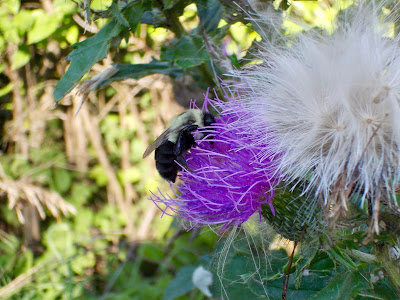Form September 14, 2018
The pollinators are on their last push it seems before the Fall season begins and the flowers are gone. It's interesting to think that they use the nectar from flowers to provide enough energy to survive through the Winter and be able to go back out the next Spring to collect it all again. The more I think about it, the more amazing this seems.
Not only do the pollinators amaze me, but the fact that flowers have developed such a system to help them reproduce. Through evolution, the flowers easily could have developed ways to self pollinate, but instead this mutual relationship between the flowers and the pollinators has remained their mode of choice. The bees get their food and the flowers are able to reproduce. But bees aren't the only pollinators.
Many people don't think of the other pollinators of this world much. When asked to name one, most people go straight for the bees, but why don't butterflies get as much love? Better yet, why not hummingbirds, or bats. Yes, Fruit Bats do help to pollinate flowers. Again it's a mutual relationship with the flowers. The bats get the nectar, the flower gets pollinated and becomes a fruit, the bat eats the fruit, the seed is released allowing it to become another fruit tree that can support more bats.
The systems of nature fascinate me so much. To think of all the ways in which things in nature are interconnected, I don't believe it is possible. This just goes to support the notion that a small change can make a big difference. We as humans need to take this into consideration when we decide to develop lands to fit our needs. What could we be taking away from nature? What systems are we interrupting? How can we help to support the systems that we are destroying once we do? These are just some of the questions that I want answered. This planet isn't only ours. We are just a small part of a very large system.
* * * *
 |
| Grey Hairstreak Butterfly (Strymon melinus) collecting it's nectar from a Dotted Gayfeather (Liatris punctata Hook). |
 |
| Common Eastern Bumble Bee (Bombus impatiens) wallowing in the inflorescence of a Tall Thistle (Cirsium altissimum (L.) Spreng). |
No comments:
Post a Comment